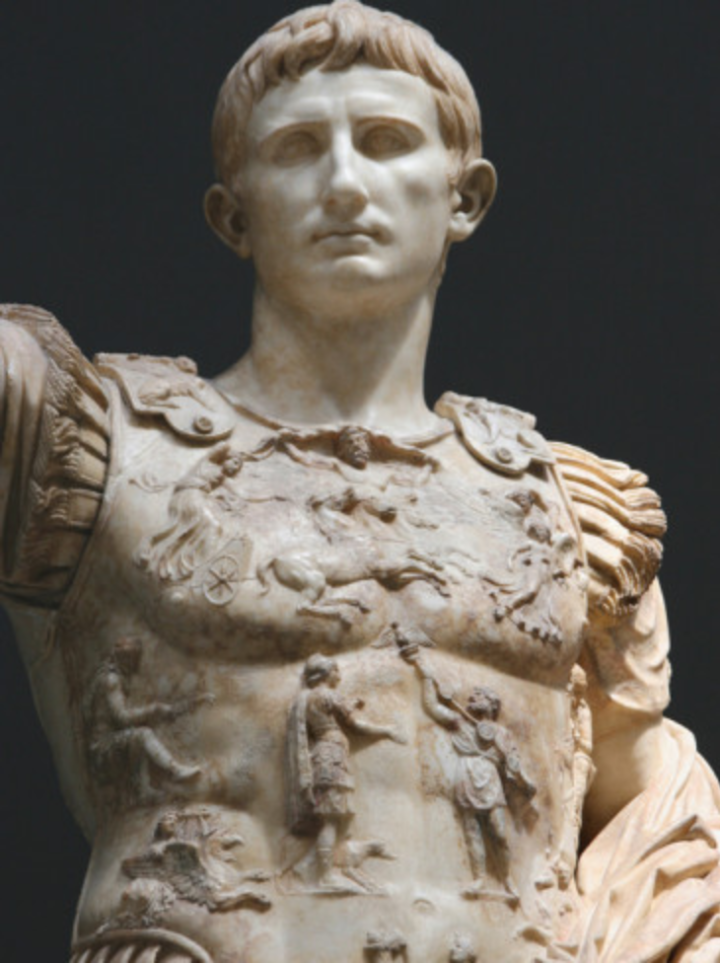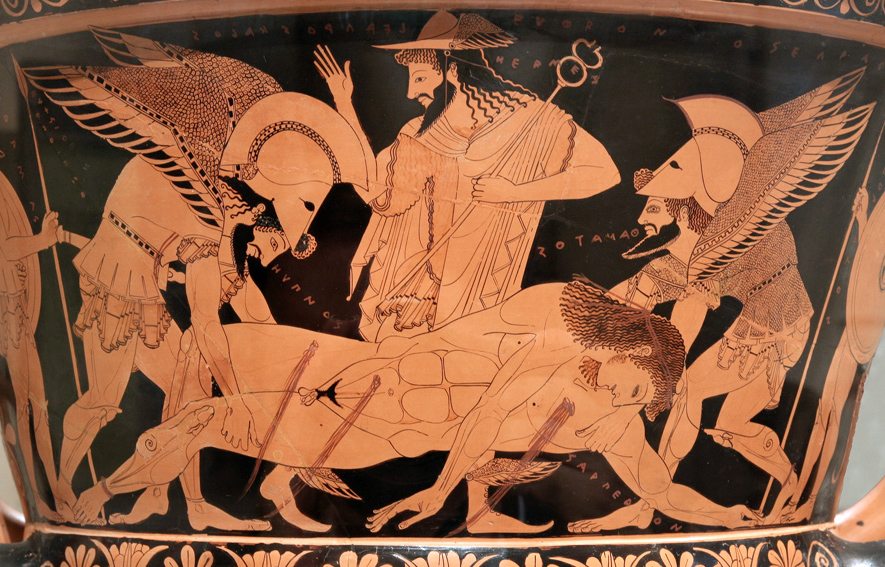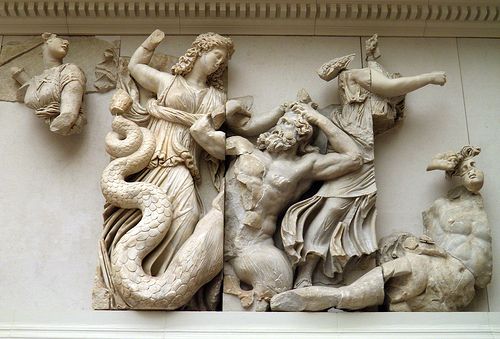CLAS 353
September 19, 2024

Evander mourning Pallas in illustrated edition of Vergil (1798)
Examination #1 Study Guide (Thursday, September 26)
Aeneid 8 (cont.): shield of Aeneas's Augustan propaganda – civil war = culturally superior West vs "emasculated" East (Orientalism); cf. Remulus's taunts to Ascanius,"Your clothes / have violet and saffron stitching . . . you love to dance, your tunics / have long sleeves and your hats are bonnets! / O Phrygian ladies . . .", 9.598ff.)

- Augustus's triumphal celebration (29 BCE) @ center of shield (8.714ff.): Augustan teleology ("goal/purpose", i.e. of history)
Aeneid 8.729-32
Aeneas admires Vulcan's shield, his mother's gift,
pleased by images he does not understand.
He hoists the fame and fate of his descendants. [cf. end of Aeneid 2]
Aeneid 9: attack against Trojan camp; Nisus & Euryalus; Turnus in action [fantasy element: Cybele's trees/ships? (9.77, 10.219ff.)]

Woodcut illustration of Strasbourg Vergil (1502)
- Nisus & Euryalus: cf. successful night raid of Odysseus & Diomedes, Iliad 10 (Rhesos's horses, 13 Trojans killed); cf. foreshadowing in running race of Aeneid 5 won by Euryalus; "The two made no reply, / but ran still faster to the woods, trusting to / the dark. . ." (9.377-9)

Nisus & Euryalus, Liebig "Extract of Meat" card (late 19th/early 20th centuries)
- relationship? (Euryalus: "there was no warrior more handsome—a boy / whose unshaved chin showed puberty's first fuzz. / They shared one mind, one heart", 9.181-3)
- mission?
Aeneid 9.184-6 (Motivations: Nisus on epic convention)
Nisus asked, “Do gods enflame our hearts,
Euryalus, or do our fierce desires become
our gods?"
- Ascanius's incentive: Dido's "antique bowl" (9.265-6)
Aeneid 9.447: nulla dies umquam memori vos eximet aevo, lit. "No day will ever remove you from unforgetting time"

Spencer Finch, Trying to Remember the Color of the Sky on That September Morning (9/11 Memorial Museum, 2014)
*DEBATE* (based on the text of Aeneid 9 & the 9/11 inscription, "NO DAY SHALL ERASE YOU FROM THE MEMORY OF TIME")
Side A: why is the quote from Aeneid 9 an inappropriate choice for the 9/11 monument honoring the WTC victims?
Side B: why is the quote from Aeneid 9 an appropriate choice for the 9/11 monument honoring the WTC victims?
- Euryalus & Messapus's helmet ("But Nisus sensed his friend was lost / to lust for slaughter", 9.353-4)

Jean-Baptiste Roman, Nisus & Euryalus (1827)
- eroticized death
Aeneid 9.431-49 (Nisus attempts to divert the Rutulians to himself)
But as he spoke, the sword plunged violently
through Euryalus' ribs, ripping open
his white chest. He crumpled, dying. Blood
ran down his lovely body; his neck slumped
like a purple flower cut down by the plow,
bending as it dies, like a poppy's drooping
neck
when heavy rain drags down its head.*
Nisus rushed at them. But among them all,
he aimed at Volcens only, took time for him alone.
The soldiers crowded him, jabbing with spears
to drive him off. He fought on still. His sword
swung round like lightning till he shoved it into
Volcens' shouting face. He killed him and died,
pierced through and through, flinging himself
on his friend's corpse, finding peace at last in death.
[*cf. 1st century BCE Roman love poet Catullus:
Tell her she can look somewhere else for my love
which she, by her crime, cut to pieces—like a
flower at the meadow’s edge that the plow, in passing,
brushed and left broken. (11.21-4)]
Lucky pair! If my song has any power,
no day will steal you from time's memory, while
Aeneas' people settle by the Capitol's
unmoving stone, and a Roman father rules.
- outcome for Nisus & Euryalus? Euryalus's mother?
- Aeneid 9.625: "Almighty Jupiter, approve my daring act" (Ascanius's prayer before killing Remulus, Iuppiter omnipotens, audacibus adnue coeptis; cf. ANNUIT COEPTIS)
- Turnus’s aristeia introduced by invocation of Muses (9.525ff.); his style of battle – inside Trojan camp before halving Pandarus's head, "Tell Priam you found Achilles here too" (9.742); cf. similes ("A savage lion . . .," 9.793ff., "As a wolf . . .," 9.59ff.)
- epic poetry as casualty of war: Cretheus, "Muses' friend and follower . . . he always sang of horses. war, battle and men" (arma uirum . . . canebat; cf. arma uirumque cano), 9.774ff.)

Jupiter & Cupid (fresco, Herculaneum, 1st century CE)
Aeneid 10: assembly of gods (speeches of Venus, Juno)
Aeneid 10.6-15 (Jupiter's speech; "Royal Jove is neutral")
"Great sky-gods, why this change
of heart, this bitter disagreement? My command
was that the Trojans and Italians should not fight. [cf. Aeneid 1.263-4; Bartsch (p. 320), "Is there any sound moral ground in this poem?"]
What's this conflict, then? What fear caused
each side to take to war and weapons? The time
for fighting will arrive (don't hasten it)
when fierce Carthage opens up the Alps
to launch destruction on Rome's citadel.
Then they can compete in hate and pillage.
For now, stop. Be allies, gladly, as agreed."
- catalogue of Aeneas’s Etruscan allies (ships); call-out to multi-ethnic Mantua (10.200ff.); return of Aeneas to camp (warned by Cybele's tree-ship-nymphs), helmet ablaze (10.270f.)
- Aeneas's venging violence: (1) human sacrifice (after Achilles) of four youths (10.517ff.); (2) slaughter of suppliant Magus (521ff.); (3) taunting of beheaded Tarquitus (557ff.); (4) slaughter of Liger begging for his life & vaunting over corpse (595ff.); (5) simile of impious giant Aegeon (566ff.)
- Turnus deluded by phantom Aeneas (Juno, narrative delay, 10.633ff.)
- battle with Mezentius (cf. Evander's story, 8.481ff.; prayer to right hand/"only god', 10.772ff.) & death of Lausus
Aeneid 10.789-93 (Lausus comes to the aid of wounded Mezentius)
But Lausus saw, and groaned
with deep love for his father, shedding tears.
Lausus, I won't silence your memory,
your hard death, or your heroism, if indeed
history tells the truth about your exploits.
Aeneid 10.815-30 (Aeneas's humanity returns )
Aeneas drove his hard blade
through the young man's body. The pointed tip went through
his shield (too thin to match his threats) and the tunic
that his mother wore with soft gold mesh. It sank in
to the hilt. Blood filled his lungs: his mournful life
descended to the shades, abandoning his body.
But when Anchises' son looked at his dying face,
that ashen otherwordly face, he groaned deeply,
pitying the boy, and stretched his hand to him.
His own paternal piety came to his mind.
"Poor boy, what can pious Aeneas give you
worthy of your bravery and noble nature?
Keep the armor you so loved. I return you
to the ghosts and ashes of your ancestors,
if you can care. Your unhappy death has one sole
comfort: you fell to great Aeneas."









